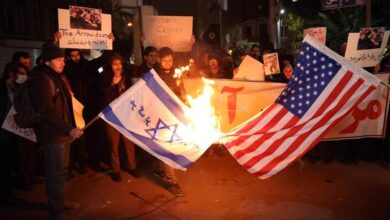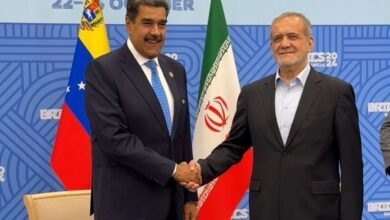Like every four years, the FIFA World Cup is not exempt from political chess and the international context surrounding it. These are the elements of international politics that you need to know to understand what is at stake in Qatar.

Photo: TW-DFB_Team_EN
LatinAmerican Post | Luis Angel Hernández Liborio
Escucha este artículo
Leer en español: El ajedrez político en Catar 2022: Entiende todo el conflicto político que se juega en el mundial
The Qatar 2022 World Cup had not started and controversy had already been generated around it, international protests over accusations of corruption and failure to protect the human rights of thousands of workers created an atmosphere of tension. But the host is just the tip of the iceberg, other political issues have "sneaked" into the football party, something natural in this type of event. The protests of Danes, Iranians, Germans, English, and Americans have been noted.
The "Truce" With Israel
Israel does not have diplomatic relations with Qatar, which represents a problem for a sporting event of the magnitude of the World Cup. So the Cup has allowed a small "truce" in the conflict and with it, thousands of Israelis and Palestinians have been able to travel directly to Doha on a temporary flight from Tel Aviv that will exist during the event. Also, Israel's passport is authorized for the month of the competition. However, the temporary status of the measures could set a precedent for eventually normalizing tense relations between Israelis and their Arab neighbors. However, the treatment of the Israeli press contrasts with that given to the fans, journalists have found rejection and even protests from the Qataris, who support the Palestinian claim.
Iran And Its Different Fronts
Since the 1979 Iranian Revolution, the country's relationship with the United States has been tense, including accusations of nuclear weapons manufacturing and human rights violations by the Iranian regime. This tension has been transferred to the field, curiously both teams have met in the World Cup on two occasions, the first in France in 1998 and the second will now in Qatar. In 1998 the Americans, still in "diapers" in the soccer aspect, lost to the Iranians in a match surrounded by messages, the Iranians gave white flowers to the Americans in line with the rapprochement of the president of Iran with the US government seeking a truce. In Qatar the situation is different, Obama reached a nuclear agreement with Iran that Trump ignored with his threats, now in the Biden government the current protests in Iran have not left him indifferent, the president has shown his support for the protesters, something that It could affect the game on November 29.
In a second front, the Iranian teams did not sing their anthem during the match against England, as a protest against their government. For several weeks the country has been submerged in demonstrations over the death of the young Mahsa Amini at the hands of the moral police for not wearing the hijab correctly. Also, on the third front, the conflict between Russia and Ukraine became visible in October, before the event, and without any of the teams present since Ukraine did not get its ticket and Russia was disqualified as a sanction for the invasion. The Ukrainian federation asked FIFA to exclude Iran as a sanction for supplying Russia with weapons, although the request was ultimately unsuccessful.
You can also read: It is time to rethink the G20: Who is there and who is participating?
Saudi Arabia And The Embargo Against Qatar
In 2017 Saudi Arabia, the United Arab Emirates, the Kingdom of Bahrain, and Egypt applied an embargo against Qatar, pointing out that the latter supported different groups considered terrorists. The blockade against the small emirate lasted almost four years until it ended in 2021, the Saudis were the authors of said embargo strengthened by the support of the Trump administration, but over time the economic and political cost for the Gulf region Pérsico ended up pushing them to a rapprochement. Although the blockade was lifted, the relationship between Qatar and its neighbors has not returned to previous levels, instead, the emirate improved its relations with Iran and even with Turkey at that time. Now, in the middle of the World Cup event, the Qataris and Saudis celebrated the historic victory of the latter over Argentina, a small moment that made the conflict disappear momentarily, but that has a long way to go.
One Love, Forbidden
Various countries, mainly European, have shown their support mainly for three causes present in Qatar: protests against labor exploitation, women's rights, and the LGBT community. In the latter case, teams from England, Wales, Germany, France, the United States, the Netherlands, Switzerland, and Denmark agreed to wear a rainbow-colored bracelet that FIFA finally banned, avoiding inconveniencing the host, a Muslim country. However, they used other means to protest either in their clothing or with some acts like the one carried out by the Germans who covered their mouths in protest. The discussion has garnered responses from people such as US Secretary of State Anthony Blinken, as well as Nancy Faeser, German Interior Minister, who has worn the banned bracelet in her box seated next to Gianni Infantino, FIFA president. Although also in support of the event, Emmanuel Macron, the French president, was reluctant to "politicize" the event, according to his own words.
Eventual Clashes
Spain – Morocco
Next January, Spain, and Morocco will normalize their diplomatic relations which had been suspended since 2015 for various reasons, including the hospitalization of the leader of the Polisario Front in Spain, and tensions over African migration to the Spanish enclaves of Ceuta and Melilla. In 2018 both countries faced each other in Russia with a draw as a result, Spain even came to consider inviting Morocco to an eventual candidacy together with Portugal for the 2030 World Cup. An eventual crossover between the two countries during Qatar 2022 could be the key to the new relationship that Spain intends to have with its neighbor to the south, which at the same time is its gateway to Africa, everything seems to be on the table to come to fruition.
Argentina – England
The Argentines and the English have had a historic football rivalry that worsened with the war between the two countries in 1982 over the Malvinas Islands. During the 1986 World Cup, with the ravages of the still recent war, they faced each other in one of the most famous matches in history where Diego Armando Maradona scored the two goals in Argentina's victory and outlined his team towards the title. The clashes between the two teams always bring to the collective memory the 1982 war and generate a discussion about the ownership of the islands over which Argentina continues to maintain a valid claim, although legally they are British. An eventual game between the two teams will undoubtedly bring up the issue.




